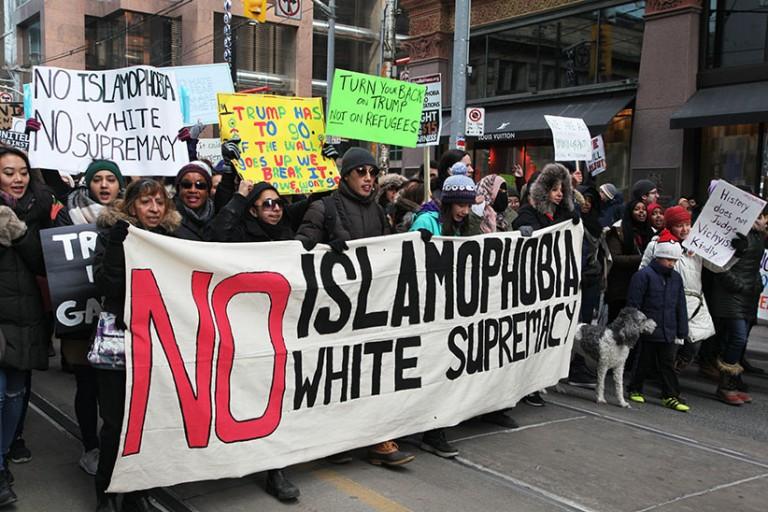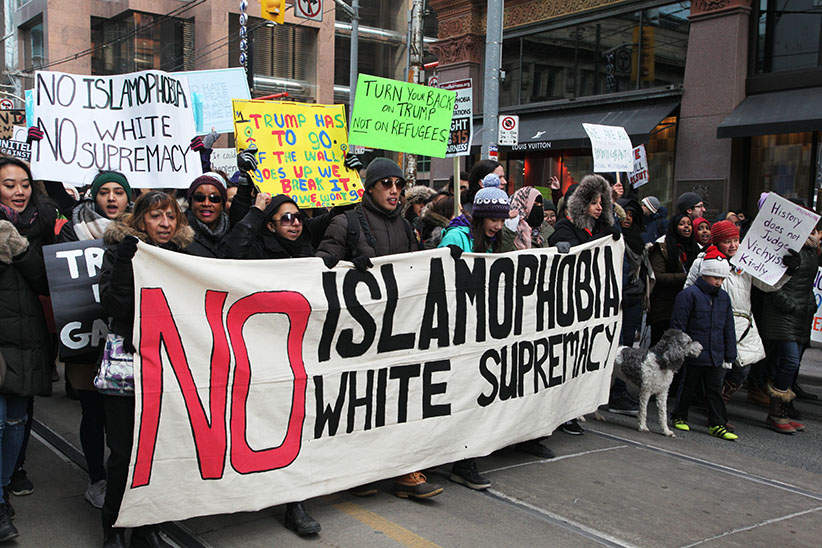How activism has evolved for Black Canadians
A charge that Trudeau is a white supremacist shows what’s changed for Black Canadians—which, for a new generation, isn’t enough

Thousands of Canadians took part in a massive protest against President Trump’s travel ban on Muslims during the National Day of Action against Islamophobia and White Supremacy in downtown Toronto, Ontario, Canada, on February 04, 2017. Canadians joined countries around the world in protesting against American President Donald Trump’s executive order, banning citizens of seven majority Muslim countries (Iran, Iraq, Sudan, Somalia, Syria, Yemen and Libya) from entering the United States for the next three months and banning Syrian refugees from indefinitely entering America. (Creative Touch Imaging Ltd./NurPhoto/Getty Images)
Share

“You must tell the constable—and remember he’s a constable, not an officer—that he has no right to stop you. Speak to him slowly and calmly, then get him to write down his badge number. Ask him to write down the number for the Attorney General as well.”
This was an elder’s response to a young man who recalled being stopped multiple times by Toronto Police and simply “wanted to be left alone.” At this small meeting of Black community members gathered to discuss possible responses to anti-Black racism in the city, the young man’s eyes began to fill with tears as he shared his experiences.
I remember fighting the mounting tension in my arms, neck, and chest just enough to shake my head in disagreement with the elder’s words. Asking for badge numbers and contact information were dangerous strategies; they advanced the naïve assumption that police harassment could be thwarted with an appeal to reason and, in so doing, put the young man at risk.
I saw glimpses of my mother in the elder. Like her and so many others who’d come to Canada in the 1970s and ’80s, he had been forged in a climate of multiculturalism. His words betrayed a deep-seated belief that Canada, as a nationalist project, was fundamentally just and that racist officers were “a few bad apples” rather than the fruit of a diseased tree. “For decades, Canadian Blacks have bought into the notion that the best way to bring about change to their status in wider society,” wrote Cecil Foster in his 1996 book A Place Called Heaven: The Meaning of Being Black in Canada, “is to infiltrate mainstream groups and make changes from within.” The assumption of this strategy, Foster notes, is that “if changes can be made one group at a time, eventually, and without anyone looking, the entire face of the mainstream would change. It would be softer, gentler, and kinder.”
Infiltrate and reform the face of the mainstream: this was the end goal that structured much of Black political engagement throughout the 1970s, ’80s, and ’90s and secured unwavering Black support for the Liberal Party of Canada, the party that catalyzed multiculturalism. Indeed, many Black Canadians not only believed but revered Pierre Elliot Trudeau when he told the House of Commons in October 1971 that “the government will assist members of all cultural groups to overcome cultural barriers to full participation in Canadian society.” Many Black Canadians latched on to this assertion, raising their children with aspirations of becoming doctors, judges, police officers, and teachers, roles where they could not only earn a respectable income but, more importantly, effect change from within. Yet, for this generation—many of whom spent their lives learning about Sir John A. Macdonald and singing the national anthem—the strategy of infiltration seems wildly out of touch with their reality. Issues such as police brutality, carding, education, housing, and employment discrimination, and the overrepresentation of Black children in the Children’s Aid Society highlight the ineffectiveness of infiltration and reform. Now, 46 years since Pierre Trudeau’s enunciation of official multiculturalism, many Black Canadians find themselves searching for a new strategy for change.
Some of those strategies have been proven not to be for the faint of heart. In February, Yusra Khogali of Black Lives Matter Toronto announced to a crowd gathered for an anti-Islamophobia rally in Toronto that Justin Trudeau was a “white supremacist terrorist coward.” Khogali’s words polarized the crowd; some cheered in support while others, awestruck and mouths agape, quickly exited the scene. The days that followed did little to resolve the matter: some commentators argued the merits of her claims highlighting, for example, Trudeau’s record of immigration detention, while other labelled her words baseless and violent and called for her resignation.
MORE: How Black Lives Matter Toronto’s Janaya Khan sees Canada
At a time when so many Canadians were celebrating the end of the Harper era and, with it, an apparent return to “sunny days,” Khogali’s words eroded the image of Canada as a genteel, meritocratic, accepting nation, instead indicting its leader on the grounds of racism and discrimination. Khogali not only named whiteness—a bold act given the state of our national discourse on race—but specifically white supremacy. She also labelled the Prime Minister a terrorist, implicating Canada as a nation trafficking in fear and oppression. While there were certainly Black Canadians who did not endorse Khogali’s words, online discussions and thinkpieces written in the aftermath of Khogali’s statement suggest that her statement wasn’t as aberrant for young Black Canadians as for their white counterparts. But regardless of where one finds themselves in relation to Khogali’s words, one thing is clear: a vision of change that does not require the nation state or the sanction of white allyship—let’s call it disruption—has begun to gain credence among Black Canadians. It may make some uncomfortable—but it’s also starting to produce results.
This paradigm was on display during BLMTO’s disruption of Toronto’s Pride Parade last summer, an action that drew the ire of many white members of the LGBTQ community who believed that BLMTO was undermining its authority and the gains that it had made in society. It was on display at Tent City when BLMTO occupied the area outside of the Toronto Police Headquarters. It was on display when BLMTO showed up at Ontario Premier Kathleen Wynne’s private residence in protest of police. These are the new tactics of disruption: disruption of parades, disruption of privacy, disruption of comfort, disruption of permission, decorum, civility, and the various ways they have been used to obscure Black plight. Disruption is inspired by a lack of visible progress promised by the Prime Minister’s own father.
Currently, BLMTO boasts 18,000 followers on Twitter including many high-profile members of the Canadian media landscape, some of whom subscribe to the same style of activism; Desmond Cole’s recent disruption of the TPS meeting in protest of carding is a compelling example. BLMTO is also actively involved in Toronto’s Black communities, holding many discussions and events and, in March, the group achieved its goal of having police banned from Toronto’s Pride parade.
I ended up speaking out against the elder’s words at the meeting; silence felt inadequate. I told the young man that an appeal to reason could not work in a system predicated upon his dehumanization, and that to assume otherwise was dangerous. When I spoke, I found myself supported by several others in the room, including a few elders. As Foster observes of Black elders, “many of them immigrated to Canada with their heads full of dreams. They were going to do well and succeed, become an example for all those back home. Now, in the middle of the night, they find themselves scratching their heads and asking what went wrong. For they did not attain their dream, and what is even more significant, they now despair their kids will be worse off than they.”
In these dire times, when 42 per cent of Black students have been suspended at least once in the Toronto District School Board and Black Canadians constitute nearly ten per cent of federal prisoners—but only three per cent of the Canadian population—unwavering subscription to infiltration is difficult and often dangerous. Entire generations of Black Canadians have watched Black teachers in Ontario face racism in the staff rooms and barriers to promotion. We’ve seen how the establishment of the SIU, a major reform secured through the tireless efforts of the Black Action Defense Committee, did not protect Jermaine Carby or Andrew Loku. We see the hollowness of the promises made four decades ago.
For Black Canadians wedded to the idea of infiltration, it is high time to acknowledge its limitations, the many ways in which the face of the mainstream has yet to soften. It is also incumbent upon non-Black Canadians and, especially, White Canadians to examine their relationship to Canada in light of history. To label Khogali’s words violent and call for her resignation without any discussion of state-produced violence is to ignore centuries of injustice in this country. It invests in ideals of merit and civility, assuming the effectiveness of nationhood, while conveniently overlooking the violence visited upon racialized bodies and, in particular, Indigenous bodies.
As people across this country move to celebrate Canada 150, the important shifts that have occurred in Black political engagement from Trudeau to Trudeau ask all Canadians to re-evaluate the narratives that structure what it means to be “Canadian.” The politics of disruption recognizes that systemic racism may be just as Canadian as maple syrup. The barriers to full participation in Canadian society have not been removed—in fact, many have been redoubled. In contrast to the decades of Black support for Pierre Trudeau, Khogali’s indictment of Justin Trudeau reminds us that it is racialized Canadians who are often left in the shadows of these long-awaited sunny days.